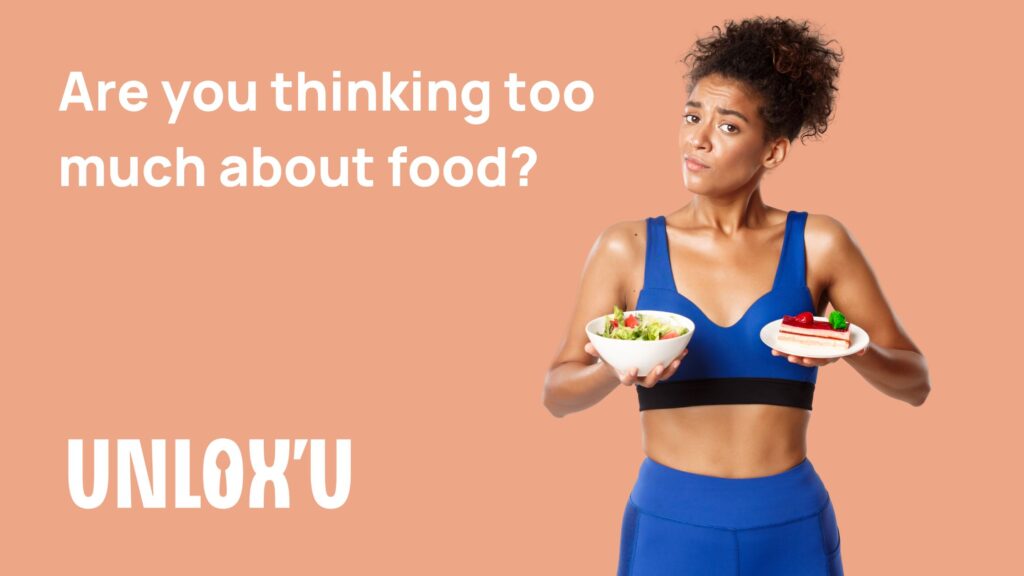
“I am always thinking about food and planning my next meal”
Have you ever felt that food is taking over your entire existence because you are always thinking about food?
If food is constantly in your thoughts even if you’re not having urges to binge and you are always thinking about eating, then this blog post is designed to help you with these constant food thoughts.
Is food taking over your life?
You may not only struggle with food cravings, overeating and binge eating but also feel like food takes up too much of your brain space. If you’re around food, you may have a hard time focusing on anything else. When you work or watch TV, you might be thinking about what’s in your refrigerator or what you’re going to eat next.
If this is the case for you, you may find yourself eating just to make those incessant thoughts about eating go away. Eating might feel like it just quiets your mind for a minute—but then once you’re done eating—it’s possible that more thoughts start to pop up about what you’re going to have next. It can feel exhausting to be constantly thinking about eating or trying to talk yourself out of eating. Understandably, you want to be able to concentrate on the rest of your life and not just concentrate on food.
Why you can’t stop thinking about food?
There could be a few possible reasons for not being able to stop thinking about food. Let’s explore the potential reasons.
You are scared to gain weight
If you are scared to gain weight, you might be “watching” what you are eating, your calories and your food intake. This naturally creates a sense of “restrictions” and “deprivation”. While food is actually available in a physical sense, your brain perceives fear of food as a danger. It is something that should be avoided and therefore restricted. The brain can’t differentiate between reality and made-up fear. Therefore, it perceives your fear of weight gain and consequently, fear of food as perceived food scarcity.
Food is our primal need for survival. When it is perceived as scarce, your brain starts prioritising it. It starts paying attention to EVERY opportunity to get food. The brain believes that finding food is the most important task to survive, therefore, you start thinking about it ALL THE TIME.
Conditioning from childhood
Were you fed to show love growing up? If you were constantly given food as a sign of love and affection, you might have developed an association between food, comfort and love. Maybe, when you experience loneliness or a sense of discomfort, you start thinking about some yummy food you have in the pantry or think about getting something delicious from the dairy close by.
Another example could be that you learned to celebrate with food. Maybe, your weekends were family time and it always involved treats, games, trips, family, laughter, and fun. Or your parents gave you special treats after you did well at school, didn’t cry at the dentist or cleaned your room.
Now, you will find yourself eating after a stressful week, a busy day or because you went to the gym and did well.
Does any of this resonate with you?
Is it the food you are eating that makes you think about food all the time?
It’s possible that a partial cause could be some of the types of food that you’re eating, which may be causing drops in blood sugar and therefore some thoughts about getting more food to get your blood sugar back up.
Our current food choices also change our gut bacteria which is also responsible for sugar and simple carbohydrate cravings. If burgers, pizza, chips, lollies, cakes and biscuits are a regular part of your diet, then this food might be changing your gut bacteria. Gut microbe changes our taste buds, the food we crave and even prefer and desire. When your gut bacteria out of balance, it will be hard for you to stop craving food all the time.
Are you addicted to the way food makes you feel?
Does food give you a sense of “high”? It’s like a relief especially after you have been fighting an urge to eat. Maybe, it’s been a really long and hard day and you just know that chocolate or a pizza would give you exactly what you need – RELAXATION.
Food changes our brain chemistry. It stimulates the reward and pleasure circuits in our brain. Particularly, highly palatable foods create a surge in dopamine (a feel-good hormone) which changes how you feel.
Eating has become your habit
Another reason why you can’t stop thinking about food might be also because eating has become your habit. It’s something you do when you are bored, when you procrastinate or just because it’s connected to an activity. Let’s say you watch a movie and feel the need to munch on something or you go to a movie and order popcorn and a drink without even thinking about it.
If you are struggling with binge eating, binge eating itself has trained your brain to binge on certain days or certain times of the day because it’s a habit you have developed over time.
How to stop thinking about food all the time?
Check your expectation
I often hear clients say: “I am still thinking about food” or “I want to stop thinking about food”. Let’s make it clear that thinking about food is not unhealthy. People with a healthy relationship with food also think about food. They look forward to their meals and enjoy food. They also plan what they are going to eat, do food prep and even plan some activities around meal times.
Thinking about food is not a problem. However, it only becomes unhealthy when these thoughts create stress, anxiety, obsession, fears and worries.
In my 1:1 coaching, I get my clients to do a written exercise. I ask them to write about their “ideal” relationship with food, how they would think and feel about eating and food in general. Maybe this is something you could do, too. Be realistic about what you expect from yourself. Ask other people how they think and feel about food to get a good perspective.
You need to EAT to stop thinking about food
As I already mentioned above, food is one of our primal needs for survival. Make sure it’s available to you. Eat balanced and regular meals with a focus on a variety of food. Add food you love, including cakes and biscuits and pizza on a regular basis so that you learn to neutralise this food and it loses its grip on you.
Focus on wholesome food. Cook your own meals as much as you can. Stabilise your blood sugar by adding protein and fat to each of your meals. This will help your body to reduce food cravings, change your gut bacteria, and even change how your brain responds to food.
Wholesome food will actually even turn the “off-switch” and make you much faster satisfied. It’s a natural body’s ability to regulate hunger and appetite.
Review and change your habits around eating
To change our habits, we first need to become aware of them. We can’t change what we are not aware of. Journal and think about your eating habits that you would like to change:
- When do you tend to eat when you are not hungry?
- What do you eat when you are not hungry?
- Do you know your common triggers for eating (apart from hunger)?
- What does food represent to you?
Identify your “ideal” way of eating and the new habits around food you would like to develop:
- How would you eat if you had a healthy relationship with food?
- When would you “ideally” be eating?
- Identify the new routine would you like to develop.
- What are you going to do to implement a new routine around habits?
Here is an article I wrote about healthy eating habits and how to change them.
Choose one habit you would like to change.
It’s important to keep it simple and not get overwhelmed. These are the steps I suggest to change any habits you would like to:
- What is the one habit you don’t like?
- Choose your “ideal” habit and what you will be doing instead.
- Be very specific about your exact behaviours and actions. The more specific you are, the easier it will be for your brain to focus on what you DO want.
- What do you need to put in place to succeed? Do you need to go shopping, prepare food, ask for accountability, buy gear, join a gym, etc? What exactly do you need to get started?
- Focus on repeating this new behaviour. Repetition is what makes your brain create new neuropathways in the brain. This is how you create long-term habits and reprogram your brain so that a new way of living, eating, feeling and behaving becomes natural to you.

Don’t know why you can’t stop eating?
Download the FREE guide to find out which of the 13 underlying triggers lead you to crave food, overeat or binge eat.
Is eating even when you are not hungry part of your childhood conditioning?
Emotional management
If anger, frustration, sadness, boredom or even happiness makes you crave food or chocolate in this case, then emotional management is one of the keys to overcoming eating as an emotional crutch.
Where do we start?
1. Make friends with your emotions. Allow yourself to feel what you feel and practice just experiencing them – without doing anything.
We don’t always need to do anything about our emotions. Trust they will pass and change. They will go as they came.
2. Learn about what your emotions tell you. They are a message that something needs your attention. Maybe it’s time to have that hard conversation you have been avoiding. If it’s time to change a job, start preparing a new CV and just have a look at what’s out there. Have you been bored lately and lost yourself? Write a list of things you could try and start ticking it off.
3. Journal or talk. We can learn a lot about ourselves when we write down what we feel or speak out loud about what is going on for us. Sometimes we feel so overwhelmed, that it’s hard to even understand what we need and want. Reading it back to ourselves or sharing it with another person, can give you lots of insights into what you feel and what you can do about it.
More help to stop thinking about food all the time:
If you want extra guidance as you learn to develop a healthy relationship with exercise, food, and weight, here are some resources for additional support:
Solve The Overeating Puzzle – Self-paced online program that gives you the exact pathway from beginning to end. A program that gives you all the information and answers you need as you end overeating, food cravings and binge eating.
1:1 Coaching – Book a FREE discovery call to discuss how we can help you to be in control of food. We will help you change your thinking, uncover what is holding you back, and get on a path to complete freedom from food issues.

Schedule your FREE Discovery Call
On this 60-75 minutes call, we will:
- Identify your challenges, your history and your goals.
- Assess the best approach to stop overeating, food cravings, binge eating and emotional eating.
- Create a plan to achieve your food and body goals in an effective and sustainable way.
- At the end, we will decide whether we are a good fit to work together to get you from where you are right now to where you want to be.



